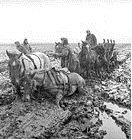Adnan Meshuggi
Posts: 2220
Joined: 8/2/2001
Status: offline

|
quote:
ORIGINAL: Rasputitsa
quote:
ORIGINAL: alfonso
quote:
ORIGINAL: Rasputitsa
The 'stop order' before Dunkirk may have been driven by the same motive, the need to control his generals, even at the risk of letting his enemy escape. 
According to Macksey, "Military Errors of Word War Two", von Rundstedt, who was the Commander-in-Chief of that German Army Group, gave the "stop order", and then Hitler approved it. Weinberg ("A world at arms") says that Hitler and von Rundstedt "...agreed that the armoured forces moving north be halted..."
The Blitzkrieg Legend, Karl Heinz Frieser, quotes Hitler as saying that he 'fully and entirely' agreed with Rundstedt and it was 'entirely identical to his (Hitler's) thoughts'. Guderian and the other panzer leaders had exceeded their orders and turned a much more conservative plan into a full scale blitzkrieg. Guderian instead of consolidating the bridgehead at Sedan, had immediately launched his attack toward the coast, this is not what Hitler had envisaged.
I believe that the situation in August 1941, at Smolensk, had it roots in this conflict. Guderian, as in France, was trying to bounce the campaign into an advance on Moscow. He was more concerned with seizing the Elyna bridgehead as a jumping off point for the next stage of the advance, than he was in closing the pocket. He was not concerned about Russian forces escaping, because he expected to catch them in the next encirclement.
However, Hitler was having no more insubordination and proceeded with his own directive in which Moscow was not the main objective. My point is that with a less interference from Hitler in the planning stage, the Kiev grouping would have been dealt with on the way to Moscow and no diversion of forces would have been necessary.
I have no idea if the earlier Marcks, Otto, or OKH planning would have won the war, Hitler and German treatment of conquered populations made that very unlikely, however well the campaign had gone, surrender did not seem to be an option. 
Hitler had "good" and "bad" moments... (no, he allways was a evil devil, i soley speak about military situations)
first of all, his "madness" allowed the manstein-plan to come true - the OHK thougth about it as madness.
But hitler, in reality a weak guy with no good nerves, damaged it from day2 of the western campagin.
Only the corps/general comanders, by mostly ignoring most of the orders of vonRundstedt and Hitler, managed to destroy so fast the british and french troops.
the "stop"-order of hitler (and v.Rundstedt) is questionable.
Sure, to be save you hold your troops. But if you want to be save you do not start any war with the guys you had to fight in "the great war".
The only real true possibility was to risk the tanks (we know now, that they had crushed the british troops and the UK had had the problem of "no regular trained army to build a larger army for "winning the war").
Hitlers biggest mistake (after declaring war to the us of a and attacking russia without force instead to crush the british empire in the mediteran sea)
In russia, his whole campagin was without a real plan.
Instead of giving real priorities he wanted to much (like in france, as the germans did at will conquering the whole country in the late phase of the campagin)
He did not understood the importance of leningrad (as a industrial center (the russians produced more t34 at this place as the germans medium/heavy tanks in the whole war), as a supply point (destroying the baltic fleet free the mining troops, ignore partisan activity in the whole northern sector (at last in 3/4 of a year), free 2 infantry armies and the finnish friends, gives a fair chance to disrupt the northern supply route (murmansk), also gives a chance to crush the whole finisch frontline of the russians), even in late august the germans could have conquered it. With enought troops (they withdraw for the moscow-operation) this could have happen early enough to improve the supply situation (maybe winter cloths for the central/southern armies could be possible if the germans support AG North by sea
the "moscow or no moscow"-discussion in june/july costs a lot - kiev could have been handled - risky? yes. but the whole campagin was a risk.
The "no retreat-order" was important at certain areas, but the attitude to die in a long frontline with zero reserve units instead of shorten the line and collect reserves for counterattacks (most times really sucsessfull and very costly for the russians if the germans had such reserves (case blue is the best example for this...) was a big mistake.
Later, nearly all orders from hitler were mistakes. Not because the generals wanted to clean their shirts, no. just because his mental defects got worse. His loss of reallity caused a lot failures. In 1941, the germans spend more money for marmor(for "welthauptstadt") as for ammo.
His attitude to collect hotair-guys around him, his cruelty (not he alone was a cruel bastard, but he gave em power) and is stupidity (in 44, he decided that it is MORE important to withdraw hungarian jews to the vernichtungslager instead of supply the central group troops with ammo, supply or fuel.
Hitler recognized in january 42 that the war was lost. his soley purpose after that was to eliminate the jews out of europe. So, no single good word about this err, person. Not even in military perspectives
|
 Printable Version
Printable Version












 New Messages
New Messages No New Messages
No New Messages Hot Topic w/ New Messages
Hot Topic w/ New Messages Hot Topic w/o New Messages
Hot Topic w/o New Messages Locked w/ New Messages
Locked w/ New Messages Locked w/o New Messages
Locked w/o New Messages Post New Thread
Post New Thread